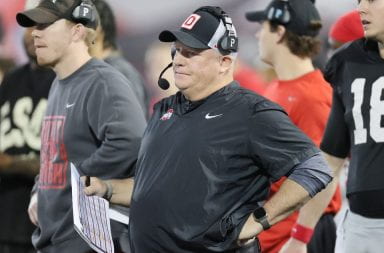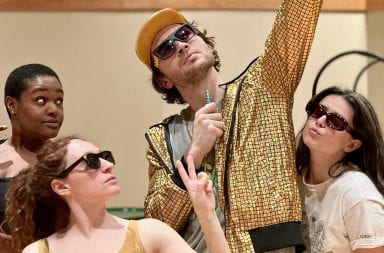Capes whipped in the wind as broomsticks collided, sending players spilling to the ground. As the chasers wrestled for control of the quaffle, the sidelines exploded into cheers as the snitch came into view from behind the distant tennis courts.
The seekers took off after the snitch, and after several minutes of angry shoving and guttural grunting, the Ohio State player raised his fist triumphantly. He caught the snitch, and the game was over.
The brooms may not have been flying, but there was plenty of magic at OSU’s first-ever quidditch tournament on Sunday night. After losing at the hands of the vaguely Slytherin-green Michigan State University, the OSU team went on to defeat the Denison University team.
While the sport lacks real magical properties, quidditch requires a certain level of athleticism to be a successful player, said Andi Hendrickson, a third-year in journalism and English and vice president of OSU’s Quidditch Club.
“It’s a lot harder than most people think,” she said. “They think we’re just running around with brooms between our legs, playing a friendly game, but it’s much more difficult than that.”
Based on the rules outlined in J.K. Rowling’s “Harry Potter” series, muggle quidditch, or quidditch sans-magic, is played with seven players on each team.
“It’s a mix of rugby and dodgeball and tag,” said Matt Retta, a second-year in industrial engineering and one of the team’s beaters.
Chasers score by throwing the quaffle, a soccer ball, into one of the other team’s goals, Hendrickson said.
Two players named the team’s beaters are tasked with throwing dodgeballs at the opposing team. When a player is hit, he or she has to touch their own goal before they can continue playing, Hendrickson said.
The game ends when the snitch, a person dressed in gold, is caught.
“(The snitch) is sort of like a flag football kind of thing. The seekers try to catch the flag,” Hendrickson said.
There are more than 200 officially registered quidditch teams in the United States, in addition to a handful of international teams, Hendrickson said.
“It’s becoming a much bigger deal on campus. People know us,” Hendrickson said. “We still get a lot of strange looks, but it’s gaining a lot of ground, not just on campus but in the nation.”
Because the sport is a part of Harry Potter–mania, it’s something that bookworms and athletes alike can enjoy, said Emily Toutkoushian, a fourth-year in sport and leisure studies and one of the club’s co-founders.
“All different skill levels can play it,” Toutkoushian said. “You can be really intense and really sporty, or you can just go out and have fun running around on a broomstick.”
While the tournament was established to give the team a chance to compete before November’s Quidditch World Cup, some joined the quidditch team as a way to reconnect with the “Harry Potter” books.
“It’s really fun. It’s a good game,” said Alex Dulin, a first-year in molecular genetics and one of the team’s beaters. “It’s a good way to live out a childhood fantasy.”


